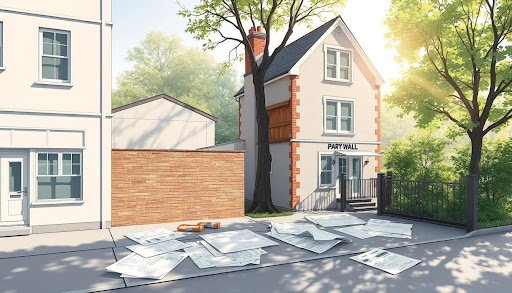
Let’s say someone wants to build a new kitchen at the back of their house. It might mean digging close to the neighbour’s wall or putting up a new wall along the property line. This can cause problems if it’s not done the right way.
That’s why people in the UK often ask experts for help before they start construction. These experts know how to deal with situations where building work could affect someone next door. They follow a process that keeps things fair and legal, and they help both sides avoid trouble.
If you live in London or anywhere else in the UK, this guide explains when these services are needed and why they matter.
Why These Services Matter for London Properties
Many homes in London are built close together. From terraced houses in Wimbledon to period flats in Notting Hill, space is tight. That means when one homeowner wants to build or dig, the work could affect a shared wall, the ground under a neighbouring home, or the structure of a connected property.
That’s where a professional service comes in. These experts help manage projects where:
- Two properties share a wall
- A homeowner wants to build near another building
- Work is planned near the foundations of another home
They help ensure the work doesn’t cause damage, and they follow steps that are required by law.
When This Help Is Required
In the UK, there’s a law that covers work involving shared or nearby property lines. If you’re building a rear extension, converting a loft, or digging for a new basement, this law may apply. The law says:
- You must send notice to your neighbour before starting work
- You must wait for their reply
- If they object or don’t respond, you must hire a professional to handle it
These professionals act as neutral figures. Their goal is to protect both sides and keep things fair.
Here are common examples of work that often needs a surveyor:
- Removing a chimney on a shared wall
- Installing steel beams in terraced homes
- Adding a floor to a flat with shared ceilings
- Building a new wall right up to the property boundary
- Digging close to a neighbour’s foundations
Even simple jobs can affect another property. That’s why getting proper advice is important.
How the Process Works
The steps are simple but must be followed exactly. Here’s what usually happens:
- Homeowner sends a written notice to the neighbour about the planned work.
- The neighbour has 14 days to respond.
- If they agree, both sides sign a basic document, and work can begin.
- If they object or don’t respond, a dispute is declared.
- A surveyor is appointed to manage the issue fairly.
- The surveyor writes a formal agreement that sets clear rules for the work.
- Work begins under the conditions agreed in the document.
This process helps prevent arguments, stops delays, and protects both sides from unexpected costs.
What the Surveyor Does
Surveyors don’t just show up and give opinions. They perform a specific job:
- Prepare notices to be sent to neighbours
- Visit the property and inspect any shared or nearby structures
- Record the condition of walls and floors before work starts
- Draft a formal agreement (called an award)
- Outline rules for how the work should be carried out
- Review if damage happens later
They help avoid guesswork and keep both sides on the same page. This service is especially helpful in busy parts of London where disputes can be more common.
If you’re based in London, Party Wall Surveyors from Wimbledon Surveyors provide expert guidance for all types of neighbouring wall agreements.
Why It’s Better to Hire Early
If you’re planning a project that may need a wall agreement, it’s better to speak to a surveyor before starting. Waiting too long can lead to delays. Sometimes neighbours feel left out of the loop, which causes tension and resistance.
By getting expert help early, you’ll:
- Know what paperwork is needed
- Avoid breaking any rules
- Get a timeline that fits your building schedule
- Prevent future disputes or claims
In some cases, neighbours are more cooperative when a professional is involved. It shows you’re handling the work properly and being respectful.
Working with a Single Surveyor
If both sides agree, one surveyor can act for both parties. This is called an “agreed surveyor.” It costs less and usually speeds up the process.
However, if one side doesn’t feel comfortable with this, they can choose their own. In that case, two surveyors are appointed. They still work together, and their job is to write a final agreement that works for everyone.
Either way, both sides have a clear process to follow, and both properties are protected.
Examples from Notting Hill and Central London
In neighbourhoods like Notting Hill, the buildings are often older. Many of them are listed or part of conservation areas. That makes the proper handling of any construction work even more important.
If you’re based in Notting Hill, Party Wall Surveyors at Notting Hill Surveyors provide expert support to handle all party wall matters in line with UK regulations.
These professionals have helped with everything from flat conversions to large basement projects where two or more buildings are involved. Their reports, notices, and agreements help avoid delays and keep projects running smoothly.
What Happens If You Skip the Process?
Some homeowners think they can save time or money by not hiring a professional. This is a mistake. Ignoring the process can lead to:
- Legal action from neighbours
- Delays from planning authorities
- Building work is being stopped
- Expensive repairs
- Problems when selling the house later
The rules are there to protect everyone involved. Following them from the start is always the better choice.
Costs and Timelines
The cost of hiring a professional depends on the size of the job, how many neighbours are affected, and whether one or two surveyors are needed. In most cases, the person starting the building work pays the full cost.
Timelines vary, but here’s a rough guide:
- Preparing and serving notice: 1–3 days
- Waiting for response: 14 days
- Agreement process (if required): 2–4 weeks
- Project begins after the agreement is signed
A good surveyor will explain these steps clearly and help you stick to your planned schedule.
Final Word
If you’re making changes to your home or building something new, it’s smart to speak with an expert first, especially if your property is attached to another. With the right advice, the process is simple and protects you from future problems.
Whether you’re in a quiet suburb or a busy London borough, expert help ensures that your project stays on track and legal from start to finish.



